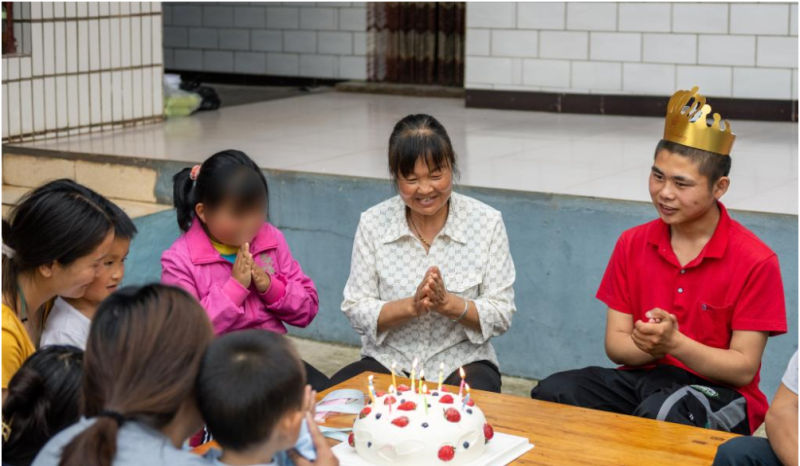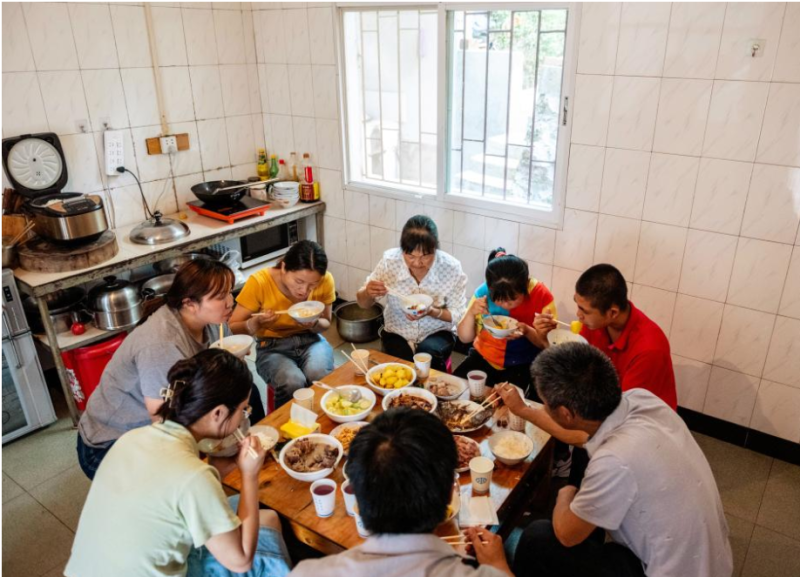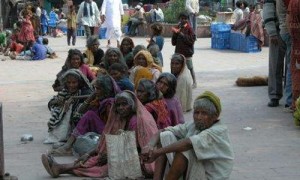昆明7月8日电曹国政告诉王炳能,孤儿和残疾儿童在他的村子里被寄养,月薪仅为316元(约合47美元),王简直不敢相信自己的耳朵,以为曹是在耍花招。
KUNMING, July 8 (Xinhua) -- When Cao Guozheng told Wang Bingneng that orphans and children with disabilities were fostered in his village for a monthly remuneration of only 316 yuan (around 47 U.S. dollars), Wang could not believe his ears and thought Cao was playing a trick.
2000年,民政部号召发展家庭寄养,时任云南省昆明市儿童之家党委书记曹某等人开始寻找合适的寄养场所试点。
In 2000, the Ministry of Civil Affairs called for the development of family foster care, prompting Cao, the then Party chief of Kunming Municipal Children's Home in southwest China's Yunnan Province, and his colleagues to begin searching for a suitable place to pilot foster parenting.
At that time, the child welfare center had only about five staff members. But, the number of orphans and children with disabilities in the welfare center exceeded 700, adding excessive stress to the institution and its staff.
"It is only family foster care that can take the pressure off the child welfare home, and most importantly it can provide orphans with a home environment, which makes a complete difference to their future growth," Wu Fashun, a staffer of the welfare home, said.
"In addition, rural areas are more suitable for foster care than cities because of the abundance of housing and workforce," Wu added.
ConVINCING THE VILLAGERS
Cao began his efforts in Wangjiatan Village because of its warm-hearted people and sound environment.
Wang, who was then the deputy chief of the village Party committee, was apprehensive about the villagers' willingness to foster the children due to the meager compensation.
"Even by working in the factory near our village one could earn 100 yuan in two days, so there was no reason for us to accept this offer," Wang said.
To persuade Wang and his villagers to foster the children, Cao and his staff members paid multiple visits to the village and even requested Zhang Fuqiang, the then Party chief of Caopu Township for help.
Wang was unable to reject them, so he turned to his relatives and Party members for foster care. Six of them, including his wife and parents, agreed to visit the child welfare home before making a final decision.
As a Party member and representative in the village congress, Deng Ziying, one of the first foster parents in the village, could not make up her mind initially. But, during a visit to the welfare center, a little boy approached her and refused to let go of her hand. "That was when I was determined to give these children a home," Deng said.
After Deng and other Party members took the lead, the first batch of 12 orphans and children with disabilities came to Wangjiatan village at the end of 2000 for foster care.
FOSTER PARENTS
Since 2001, Cao Liqiong's family has taken in one of the highest numbers of children in the whole village, fostering a total of 31 orphans and children with disabilities.
Cao Liqiong is one of the third batch of villagers to take part in foster parenting. She decided to bring these children, who were the same age as her own, into her house to compensate for their lack of parental affection.
"Children who are healthy and relatively young are usually adopted by other families within a few months of foster care," said Cao Liqiong. "only those with disabilities stay back with us."
Abin (pseudonym) has lived with Cao Liqiong's family for 13 years. Due to his intellectual disability, he could not get dressed or take care of himself.
To prevent Abin from wetting the bed, Cao Liqiong had to wake him up every night for nearly three years. In order to cultivate Abin's self-care ability, he was also taught to get himself dressed for over four years.
After Abin once went missing at the age of 14, Cao Liqiong had to devote more time to him than the other children.
"I had asked him to deliver the car key to his brother, but a few minutes later, I could not find him anywhere" Cao Liqiong recalled.
She reached out to the entire village and the police for help and stayed awake the whole night to make sure she doesn't miss the sound of Abin knocking on the door.
A day later, Abin was found by other villagers playing with stones next to a pond in the nearby mountain.
"He was shivering when he returned home, and I held him firmly in my arms until he fell asleep," said Cao Liqiong. "I have never left him alone ever since the incident."
TEARS OF JOY
According to the rule of the welfare home, after a child turns 18, he/she has to leave their foster home and lead an independent life if they are not adopted.
Cao Liqiong, who has fostered 31 children, has said many goodbyes. She recalls every child's name and maintains photographs of herself with them in a large picture album as a token of reminiscence.
"Every time a child leaves, a mother will shed tears, but they will always be our children and in our hearts, no matter where they go," she said.
For 22 years, Wangjiatan Village, home to more than 1,300 people, has fostered over 1,500 orphans and children with disabilities. From as many as 300 children, the village now has only around 90 children.
"It's a good sign indicating that cases of child abduction and abandonment have reduced, and our village is about to accomplish its task," Wang Bingneng said.
Abin is expected to leave at the end of this year as he has attained adulthood. Thanks to Cao Liqiong's guidance, he can now take care of himself and do light chores such as carrying the basket for his foster mother.
Abin loves to sing and his favorite song is "Mother," even though he doesn't understand the meaning of the lyrics.
"I believe he can feel the warmth of this family, and he will always remember this place as his home," Cao Liqiong said.

Cao Liqiong's family celebrates the 19th birthday for Abin (pseudonym) in Wangjiatan Village of Caopu Township in Anning, southwest China's Yunnan Province, May 20, 2022. (Xinhua/Cao Mengyao)








